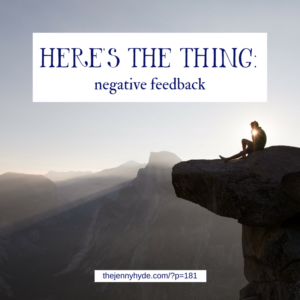 Every Friday I post a “here’s the thing” blog. “Here’s the thing” is something my mum (and many other wise people) like to say when they’re about to make a good point. Hopefully these posts are also good points.
Every Friday I post a “here’s the thing” blog. “Here’s the thing” is something my mum (and many other wise people) like to say when they’re about to make a good point. Hopefully these posts are also good points.
Getting feedback on products, orders, services, social media posts, photos and, y’know, everything is really important for businesses. Do customers like it? Does your mum like it? Is there anything that could be better? Why would they buy it? Why wouldn’t they buy it? Do they think it’s a 5 out of 10 or an 8 out of 10?
Knowing about people’s experiences can help you to streamline and develop your business for the better.
And when people love your stuff, it’s really, really uplifting. You remember what you’ve always known but sometimes forget: that this is what you love to do, what you’re meant to do, what you’ve worked really hard to be able to do.
Woohoo!
Negative feedback. Oh, the pain.
You worked really hard to create something that’s kind of part of you. You made it. It came from your brain, via your hands, into the world. And they don’t like it. They think it’s too expensive, or too flimsy, or too small, or it was delivered later than they expected. They don’t like the colour.
Or, as I heard from a friend recently, their boyfriend didn’t like the envelope. (Please, get a grip.)
And out of the thousands of customers who are happy, delighted, ecstatic or just quietly content (because that’s great too), you remember the handful of negative comments.
Why? And how do you get rid of it?
We’re genetically, evolutionarily* programmed to receive feedback and moderate behaviour based on it. We do it as kids, and it’s how we learn to read and write and exist with fellow human beings. You get corrected on your spelling, and you learn from it. You burp at the table, get told off, and you learn from it.
As a species, it’s really important that we please our tribe so they don’t throw us out on our own, where we’ll die via lions and tigers and bears (oh my!).
And when you’re a creative business, a solopreneur, that’s terrifying. You’ve built a tribe of customers who aren’t obligated to like you (they’re not your mum) and you’ve got them to buy something from you, and you get really excited about building this group of brilliant people who get you, get your craft, get your products and then… Damn. They don’t like it. They don’t like it as much as you want them to like it.
You worry. You worry that everyone will think the same as them. You equate one person’s opinion with eternal truth. You lose perspective. Your evolutionary brain is telling you to moderate your behaviour. Change everything about your business to please everyone. And it gets angry, because your safety is threatened. Or it breaks down and tries to hide from the truth, because fight or flight is a real thing that happens every day.
And I know. I’ve been there. In two months, I’ve had one person say something I’ve offered is too expensive. That’s one person versus the eight mentoring clients and 20+ other clients I’ve worked with, who are happy and grateful and value what I do. (Hi guys, love you.)
And it got me. I had to walk around the flat physically trying to shake the feeling off me. Had I missed the mark? Should I not have offered it? Was I barking up the wrong tree?
No. Perspective. A service that offers value and, well, service. 28+ clients. In two months. And the realisation that I can’t please everyone. And that I don’t want to.
So here’s the thing:
Negative feedback happens, especially as your business grows and you get more customers. Because a wider pool of customers means a higher risk of crazy people or people who don’t get it or people who value other stuff to you.
First step: Is it actually true? If the order to negative ratio is more than, say, 10%, you might need to consider whether you’ve got a quality issue or room-for-improvement value proposition. No biggie. Roll with it. Call me. You can deal with it.
Second step: Perspective. Opinion is not fact. One person’s preference for envelopes doesn’t make yours crap. One person’s ridiculously high expectation doesn’t mean you have to match it.
Third step: Get it out. Tell someone. Rant about it. Let it go. Write it down and set fire to it. Whatever it takes to get it out of your head.
It’s your job to put a great product out there, with a fair price, with clear expectations, and then deliver on it. It’s also your job to take constructive criticism and consider whether feedback would make your product and service better. It’s their job to understand the product, accept the limitations and nature of the product, and receive it.
It is not your job to succumb to every whim of every weirdo who didn’t get it.
As Brené Brown (there she is again) says, “Don’t try to win over the haters; you are not the jackass whisperer.”
*I wasn’t sure evolutionarily was a word, but it totally is and I learned something today.




